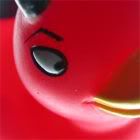2005-08-10 - 12:31 p.m.
Okay, inquiring minds want to know, so I'll tell you, but this promises to be the most boring entry in the history of diaryland.
How hot water can freeze before cold water:
It's been known about since the time of Aristotle but is frequently called the Mpemba effect.
You have to have containers of the same size and shape. The water temperature must be uniform in both (meaning the hot water must all be at the same degrees and the cooler water must be at the same degrees).
It won't work for all container shapes and sizes and won't work at every separation of temperature (obviously if you try with 100 degree water and 33 degree water the 100 degree won't wi.
No one knows the exact reason for the effect but here's what scientists have come up with so far:
Evaporation may lead to faster freezing because the mass changes. Hot water will evaporate more quickly so when it gets to a cooling point it will freeze more quickly because there is less water in this container than the originally cool one.
Dissolved gasses: Hot water holds less dissolved gas than cold water, and large amounts of gas escape upon boiling. So the initially warmer water may have less dissolved gas than the initially cooler water. It has been speculated that this changes the properties of the water in some way, perhaps making it easier to develop convection currents (making it easier to cool), or decreasing the amount of heat required to freeze a unit mass of water, or changing the boiling point.
Convection:
As the water cools it will eventually develop convection currents and a non-uniform temperature distribution. At most temperatures, density decreases with increasing temperature, and so the surface of the water will be warmer than the bottom or what is known as a hot top. If the water loses heat through the surface water with a hot top will lose heat faster than we would expect based on its average temperature. When the initially warmer water has cooled to an average temperature the same as the initial temperature of the initially cooler water, it will have a hot top, and thus its rate of cooling will be faster than the rate of cooling of the initially cooler water at the same average temperature.
Surrounding: A difference between the cooling of the two containers relates not to the water itself, but to the surrounding environment. The initially warmer water may change the environment around it in some complex fashion, and thus affect the cooling process. For example, if the container is sitting on a layer of frost which conducts heat poorly, the hot water may melt that layer of frost, and thus establish a better cooling system .
There you go, bet you're sorry you asked.
click here to add to the 4 comments so far



